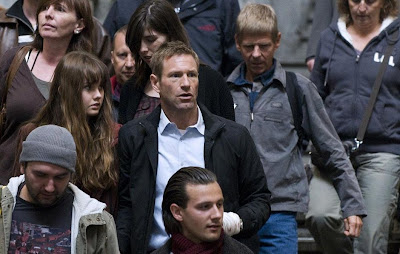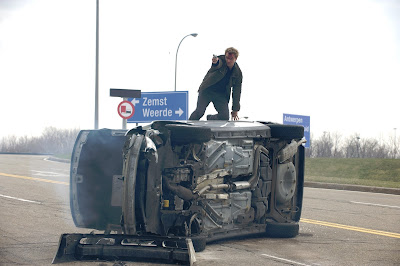"The scholar's work is more sacred
than the blood of martyrs."
-- the Quran.
Novelist Noah Gordon (shown below, now near 90, and called 'the most successful writer you've never heard of') authored a trilogy spanning 1000 years about physician Rob Cole and his descendants. The first book of this trilogy (1986), THE PHYSICIAN, became a film directed by German filmmaker Philipp Stolzl (Young Goethe in Love, North Face, Erased) and has spawned a musical that debuts this June in Germany. Neither the novel nor the movie gained a following here but were much appreciated abroad. Now, at least, the film is streaming on Netflix for fans of fictional historical drama like Restoration (also on Netflix) or Lawrence of Arabia. The Physician, however, is loaded with political relevance to us because of its war on secularism by radical Islam. (Click here for Noah Gordon's web site and a list of his historical novels.)
An orphan boy, Rob Cole (Adam Thomas Wright, below) watched his mother die of 'side-sickness' -- appendicitis was a death sentence. Now homeless, he attaches himself to Barber and learns the tricks of the trade but he's frustrated -- diseases of the inside were guesswork and dissection of the human body was a crime. Rob grows up craving knowledge about how the inside of the body works.
Adult Rob Cole is played by Tom Payne, a better actor than, and lookalike to, Lorenzo Richelmy of Netflix's Marco Polo. Payne (below, right) is currently in AMC's The Walking Dead and is compelling enough to hold the center even in the midst of players with much more gravitas.
At the time, we are told, some say erroneously, that Christians were unwelcome at Ibn Sina's Madrassa. Since Jews were accepted, Rob circumcises himself during his desert journey to Isfahan and takes on a Jewish identity, calling himself Jesse ben Benjamin on his arrival.
Jesse continues to be daunted by the religious ban on dissection -- "necromancy" being punishable by death in Persia as well as England. But his entrepreneurial skills make him a problem solver -- especially useful as an epidemic of plague begins to decimate the population. The Shah at the time (Olivier Martinez, below) is the chief support of Ibn Sina's scientific work. A vain and secular tyrant, he's ripe for overthrow, outraging local religious leaders:
"Why did our citizens have to die [of plague]?" shouts the Imam (Makram Khoury). "It is the sins committed each and every day in the university whose Godless philosophy corrupts our city..... Isfahan is decaying from vice and apostasy. The Shah's time is over, and now there is only God... Allahu Akbar!"
A religious revolution is brewing. The tolerant, decadent Shah will be swept away in the denoument, driving out Jews and scholars and destroying Ibn Sina's university. The militant Seljuk Turks join forces with the mullahs whose fervor is a mirror image of 21st century religious extremism. The Turkish period will eventually contribute to the decline of the Islamic Gol-den Era. (The rule of the Seljuks, by the way, was followed by Mongol rule throughout Persia.)
Criticism doesn't change one's mind about the film's being a fairly entertaining and fast-moving tale. There are particular objections to the tampering with history creating inaccuracies about the known life and times of Ibn Sina. Still, all reimagined history is guilty of same -- the abridging of fact for the purpose of story-telling. Also there's the soap-opera framework including Rob/Jesse's dangerous romance with Rebecca (Emma Rigby), a Spanish Jew who has been sent to Isfahan for an arranged marriage to a much older Jewish aristocrat (below: Rebecca en route Isfahan).
Still, the yarn immerses you satisfyingly into ancient Persia through close-ups of daily life. Woven into the tapestry are Muslim calls to prayer and orthodox Jewish ritual at home and worship (the blowing of the shofar and wearing of prayer phylacteries), the burying alive of a woman adulterer, a medical school that functions with impressive urgency, costuming that feels real in off-whites and rich desert taupes and browns, and lovely effects by Pixomondo (Marco Polo, Game of Thrones) that bring the city-in-the-desert setting to life.
What enlivens the whole affair for me are the provocative politics, starting with the sameness of 11th and 21st century radical Islam. Then there's the contrast between the Golden Age of Islam and the intellectual poverty of the West at the time; and last, is the stunning present day reversal of fortunes between Middle East and the West. It's enough to make the viewer think twice about the inevitable and cyclical rise and fall of nations and the persisting tension between religious belief and intellectual progress. As for imaginary Rob Cole: Following his bout with radical Islam, his trajectory went up.
The above post is written by our
monthly correspondent, Lee Liberman.






























